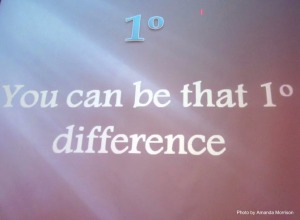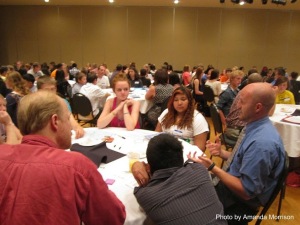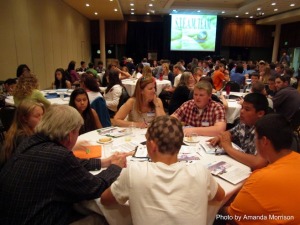
May, 2013: NREL Project Supports Student Learning About Climate Change

As the K-12 Education Coordinator at NREL, I spend a lot of time sitting at my desk working on program logistics, in meetings with scientists and educators, and answering emails. Sometimes I forget that these actions are actually contributing to something meaningful that happens outside of the four walls of my office.
In November 2012, John Moore and Randy Boone’s Northern Colorado Global Climate Change Education project (NC-GCCE), funded for 3 years by NASA, brought together 24 local middle and high school teachers in 4 professional development workshops. The content delivered during these workshops focused on using remote sensing data to understand climate change on local and global landscapes. Lead Teachers were recruited in 2011 and 2012 to work with NREL scientists and Teachers in Residence to develop teaching modules that would be used in grade 6-12 classrooms across northern Colorado. These teachers created a Prequel module on the basics of remote sensing as well as 5 modules focused on the following topics: Oceans, Ice and Climate; Earth’s Four Spheres; Climate Change Past & Present; Fire Ecology; Earth’s Energy Budget. Twenty of the 24 teachers implemented a minimum of one module in their classroom(s) during the Spring 2013 semester at Poudre and Greeley schools, reaching nearly 2,000 students.
Most intriguing (and unusual) to me was that not only did Lincoln IB World Middle School send a Science teacher to all four module trainings, but a History and an English teacher came as well. Their idea was to take an interdisciplinary approach to teaching this topic, something I have rarely encountered in my many years of working with K-12 science teachers. I was anxious to see how well this method worked for the school, as it is known to connect content across subjects, allows relationships to be made between subjects, and offers students a range of learning experiences. This leads to an increase in student learning and understanding which is something that, as an educator, I get very excited about.

On Tuesday, May 14th, the NC-GCCE team was invited to attend Lincoln’s Colorado Climate Change Summit 2013. This is the fourth year that a teacher at Lincoln has arranged an annual summit led by students, with each year the topic focusing on an environmental issue (in 2012 the topic was fracking). Teacher Jake McCollumb’s opening remarks emphasized their school’s commitment to being risk takers, being open-minded, and encouraging inquiry. Senator John Kefalas gave encouraging words to all about the importance of making informed decisions and looking at differing perspectives.
Held in a ballroom at the Lory Student Center, nearly 150 8th graders, Poudre High School students, parents, teachers, and CSU faculty and staff involved in climate science research came together to talk about the Climate Change issue. Senator Kefalas, Representative Joann Ginal, and Representative Randy Fischer were also included in the roundtable discussions facilitated by students. Discussion took place around key questions such as:
- How concerned should we be about climate change and why?
- What specific impacts are occurring in our local, national, and global communities?
- Is the problem too big that we can’t do anything about it?
- What exactly is causing the change?
For an hour, incredibly insightful and well-informed discussions occurred at each table with students using data driven evidence to support their claims. These students spoke with passion and optimism about an issue that can be very overwhelming. Roundtable conversation ended with students forming a closing statement where they expressed what challenges, insights and inspiration they gained during the summit. They then took a few minutes to write a reflection in which they outlined goals for actions that they will take to reduce their personal impact on climate change.

Representative Fischer spoke about the importance of learning the facts and knowing what happens around us, as well as how the environment is critical to include in classroom education. The event closed with a chance for anyone to stand up and tell the group how they felt about the learning experience, followed by a presentation given by the STEAM (Saving The Environment and Money) team at Lincoln who highlighted the goals and achievements within their school community for the current school year.
What I had not realized going into the ballroom that day was that the NC- GCCE project had provided the majority of the background knowledge to the students and their teachers, on which they were able to draw in order to have the discussions they had at this Summit. It hit me like a ton of bricks that I was a part of a whole that helped provide this learning opportunity. Even if my contribution was working out logistics, spending countless hours in meetings, and supporting teachers through email every day, my small part helped make a difference in the lives of nearly 2000 people I have never even met, and that has a great deal of meaning!
To learn more, please visit the Northern Colorado NASA Global Climate Change Education project. Teaching modules are available on the site.